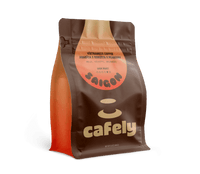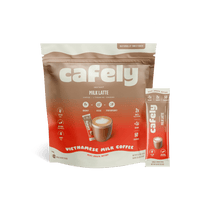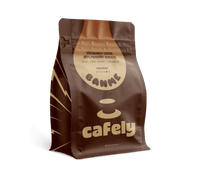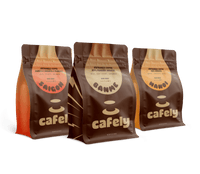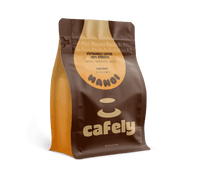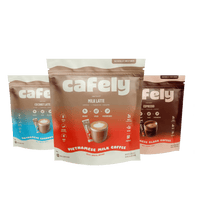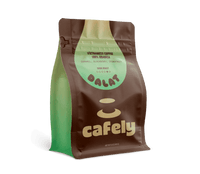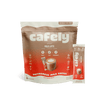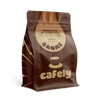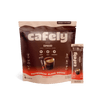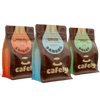It’s generally a good idea to wait between two and three hours after consuming coffee before you breastfeed your baby. This gives your body a chance to metabolize the caffeine — an important factor when considering how long caffeine wears off and how much might remain in your system during feeding.
If you don’t wait long enough, you could pass on high amounts of caffeine to your baby through breastfeeding. This may lead to undesired effects or behaviors in your child, such as jitteriness or sleep issues.
Read on to learn more about how to safely consume caffeine while breastfeeding, how much coffee you can drink, and why it’s important to time your consumption properly.
Is it Safe to Consume Caffeine While Breastfeeding?
Yes, it’s generally safe for mothers to consume caffeine while breastfeeding. This is because most of the caffeine you consume when drinking coffee is quickly metabolized by the liver.
So, whether you like to enjoy a strong, sweet, creamy Vietnamese coffee or a bold cup of espresso, it’s completely fine to enjoy coffee in moderation while breastfeeding.
However, a small amount of caffeine can be passed onto the child through breastmilk, so you need to be careful with when you consume coffee and how much you have. Thankfully, the amount is incredibly low — around 1.5% of the caffeine you consume. If you notice that coffee doesn't affect you that much, it could be due to your body's fast caffeine metabolism — which also means even less may transfer to your baby.
Still, it’s important to wait two to three hours before breastfeeding to ensure you give your body a chance to absorb the caffeine properly. The peak level of caffeine in breast milk is often around an hour after consumption, so only waiting a short time before breastfeeding may not be enough.
How Much Caffeine Can I Consume While Breastfeeding?

While you can consume caffeine while you’re breastfeeding, it’s incredibly important to monitor how much you have. Many experts recommend that you limit your consumption to between 200–300 mg per day while you’re breastfeeding, which is around two to three cups of coffee.
This is only slightly lower than the 400 mg limit that’s recommended for adults.
Different Types of Coffee Contain Different Amounts of Caffeine
While two to three cups of coffee per day is the recommended limit for breastfeeding parents, the exact amount depends on the type of coffee you consume. This is because not all coffee contains the same amount of caffeine per cup.
For example, robusta beans contain twice the amount of caffeine as arabica beans. Similarly, the way you brew coffee may also impact how much caffeine is in each serving. For example, if you opt for longer brewing times or pressurized methods like espresso or moka pot, your coffee will generally contain higher caffeine content.
Caffeine From Sources Other Than Coffee
While monitoring your coffee consumption is crucial, don’t forget about other sources of caffeine. Many things you may consume daily without a second thought contain caffeine. This includes a variety of foods, such as chocolate, nuts, and even some kinds of chewing gum.
Several beverages also give you a jolt of caffeine, like in a cup of tea, energy drinks, and soda drinks. While some of these may only have a small amount of caffeine, others have more than you think. For example, Mountain Dew has upwards of 54 mg of caffeine, with some flavors having nearly 100 mg per can.
Some medications and supplements, such as pre-workout powders or pain relievers, may also contain caffeine. So if you’re trying to ease the pain and headaches that often come with raising a new baby, make sure to take a close look at the ingredients list first.
If you want to consume any of these other caffeine sources throughout your day, make sure to lower your coffee intake to ensure you remain under the 200 to 300 mg limit that experts recommend.
The Risks Associated With Drinking Coffee While Breastfeeding
Consuming caffeine while breastfeeding is generally safe in moderation. However, it’s still important to be aware of the risks and how caffeine may impact your child.
Some signs that your child may be reacting poorly to caffeine include:
- Restlessness
- Increase irritability
- Fussiness
- Uncontrollable jitters
- Difficulty falling or staying asleep
You should know that the exact effects and risks vary from one baby to the next. Some may act completely normal with a little bit of caffeine in their systems, while others are more sensitive.
If you find that your baby is having a hard time settling down or sleeping, you may want to decrease your caffeine intake or stop consuming it altogether.
In addition to these effects, according to studies, high caffeine intake (generally more than 450 mg per day) may also decrease the iron concentration in breast milk [1]. This could lead to a deficiency in some infants.
Frequently Asked Questions: How Long to Wait After Drinking Coffee Before Breastfeeding
Want to learn more?
Let’s go over some frequently asked questions about coffee and breastfeeding, as well as their answers.
1. How Many Hours Should You Wait After Drinking Coffee to Breastfeed?
If possible, you should wait between two and three hours after drinking coffee before you breastfeed your child.
2. Does Caffeine Pass into Breast Milk?

Yes, caffeine can pass through your body and into your breast milk. However, the amount that passes through is normally very low.
3. How Do I Know if Caffeine is Affecting My Baby?
If you notice that your baby is more fussy than usual, acting irritable, seeming more alert than usual, or having trouble sleeping, it may be a sign that caffeine is affecting your child.
4. What’s the Best Time to Drink Coffee If You’re Breastfeeding?
If you’re able to, consuming your coffee and caffeine right after breastfeeding is the best time. This ensures it will be entirely out of your system by the next time you need to feed your baby.
5. What are the Risks of Drinking Coffee While Breastfeeding?
The main risk of consuming coffee while breastfeeding is passing the caffeine to your baby through your breast milk. Also, some experts believe that high caffeine consumption may lower the iron levels in your breast milk.
6. What Things to Drink For Healthier Breastmilk?
If you want your breastmilk to be as healthy and as nourishing as possible for your baby, make sure you drink plenty of water. Also, consider consuming cow’s milk or herbal teas instead. In general, simply remaining well-hydrated helps to produce healthy breast milk.
7. What are Some Other Caffeine Sources to Watch Out For When Breastfeeding?
Other caffeine sources to be careful with while breastfeeding include soda, chocolate, energy drinks, some workout supplements, and even certain over-the-counter medications.
8. How Much Caffeine is Safe for Breastfeeding Mothers to Have?
The guidelines vary, but most experts say that it’s safe for a breastfeeding mother to have up to 200 to 300 mg of caffeine per day.
9. Does Caffeine Consumption Hurt Breastmilk Supply?
No, drinking caffeine hasn't been found to decrease your breast milk supply.
10. Is it Okay to Drink Decaf Coffee While Breastfeeding?
Yes, it’s safe to drink decaf coffee while breastfeeding. However, some decaf coffee may still have trace amounts of caffeine, so it’s still important to monitor your intake.
References
- Munoz, L. M., Lönnerdal, B., Keen, C. L., & Dewey, K. G. (1988). Coffee consumption as a factor in iron deficiency anemia among pregnant women and their infants in Costa Rica. The American journal of clinical nutrition, 48(3), 645-651.
